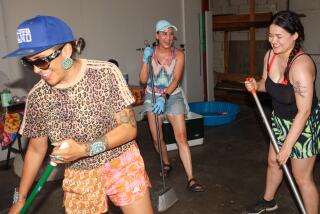Southland Bahai Faithful Dedicate New L.A. Center
- Share via
Southern California followers of the Bahai religion, which hopes one day to unify humanity, dedicated their new Los Angeles center Sunday with prayers in Russian, French, Tongan, Swahili and Persian, break-dancing and spirituals sung by a multiracial choir.
“I don’t know when I’ve heard white folks sing a spiritual like black folks, and if that wasn’t enough, they got up and danced like black folks,” said Mayor Tom Bradley, who said his friendship with local Bahais goes back to a fight against segregated housing in the early 1960s.
The afternoon ceremony in the building once known as Rodeo Bowl and Billiards came after more than 10 years of effort to refurbish the building, said Burrell Bullock, chairman of the Bahai Spiritual Assembly.
“We waited until we had the money in hand before we spent it,” said Bullock, noting that the religion does not believe in credit to finance its facilities.
The site, near the corner of La Cienega Boulevard and Rodeo Road in Baldwin Hills, was chosen because of its nearness to neighborhoods inhabited by various ethnic groups.
“We built our new center here because the principle of racial unity is so fundamental to our faith,” Bullock said. He said the spiritual assembly refused to consider any site that was not in an integrated area.
Behind its plain exterior the building features classrooms, a 750-seat auditorium, audio-visual facilities to acquaint the public with the Bahai faith and hospitality rooms for the evening meetings known as “firesides,” where newcomers get acquainted with the religion.
Although their faith traces back to the Shia branch of Islam, today’s Bahais say their religion is as different from Islam as Christianity is from Judaism.
Indeed, the Shia regime of present-day Iran has persecuted Bahaism as a political threat, much as the founder of the Bahai faith was hounded by the clerical and secular rulers of 19th-Century Persia, as Iran was then known.
Exiled to Turkey and eventually to Haifa in what is now Israel, Mirza Husayn-Ali, called Bahaullah, the Glory of God, preached a doctrine of an unknowable God who revealed himself through messengers including Abraham, Moses, Zoroaster, Buddha, Jesus, Mohammed and the Bab, the Iranian visionary who was the Bahaullah’s inspiration.
The founder, who died at age 75 in 1892, presided over the spread of his religion to much of the Middle East, northern Africa and southern Europe.
Under his son and great-grandson, Bahai grew until it now claims 4.5 million adherents in more than 200 countries and territories, including about 1,500 in the city of Los Angeles, 3,500 in all of Los Angeles County and about 6,500 in Southern California.
About half of Los Angeles Bahai followers are Iranian refugees who fled the campaign against their religion that began with the rise of the Ayatollah Ruhollah Khomeini to power in Iran in 1979.
Bahais have no clergy. After the death of Shoghi Effendi Rabbani, the founder’s grandson, in 1957, the sect has been led by a nine-member Universal House of Justice housed in a lush garden compound overlooking Haifa Bay.
Bahai followers dream of the ultimate unification of mankind, with a common language, no prejudice, equality of men and women and harmony between science and religion.
Bahais are expected to pray daily, to fast 19 days a year, to forsake drugs and alcohol, to marry only with the consent of their parents and to attend monthly meetings.
More to Read
Sign up for Essential California
The most important California stories and recommendations in your inbox every morning.
You may occasionally receive promotional content from the Los Angeles Times.










